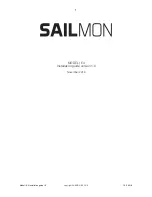
MN260 B | 11
Service Manual
1.0 THEORY OF OPERATION
BASIC THEORY OF OPERATION
SAROS Oxygen System uses a variable speed compressor to provide both positive and negative air pressure and is driven by a
Brushless DC Motor (BLDC) and drive system.
The ATF
®
Concentrator Module accepts positively and negatively pressurized air and extracts oxygen from this air using the Pres-
sure Swing Adsorption (PSA) process. The ATF module sub-components consist of patented rotary valves, manifold, housing,
sieve beds, and a stepper motor / gear drive system. The rotary valve system channels the gas in a sequential manner to each of
the sieve beds. Each bed is pressurized to force the oxygen through the sieve and into the product tank while most of the nitrogen
is separated and remains in the sieve. Once the process is maximized then the sieve beds are purged of the nitrogen. The purged
nitrogen is then vented to atmosphere through the exhaust vent. The process is continuously repeated in each sieve bed.
The flow of produced oxygen passes from the product tank to a flow and concentration monitoring and control system which
utilizes a proprietary ultrasonic flow and concentration sensor. It then continues through a flow control valve to accurately control
the flow of oxygen in continuous and pulse flow modes. The oxygen then passes through a HEPA filter and is delivered to the
oxygen outlet port.
The oxygen flow rate and mode are selected by the user. In continuous flow mode, oxygen is delivered continuously at rates of 1,
2, and 3 LPM and, in pulse flow mode; a bolus is delivered at the beginning of each inspiration with selectable volume delivery
approximately equivalent to rates between 16 and 96 mL.
The SAROS electronic system, together with embedded operational firmware, provide the means to manage power, control
oxygen production, monitor safety functions and interface with the user. Power management functions include switching between
various power inputs, driving the compressor, ATF stepper motor, and proportional valve, monitoring battery status and charging
when power is available from an external source. System management functions include monitoring all flow, pressures, concentra-
tions and safety functions. User Interface components such as buttons, illuminated indicators, LCD display and audio transducer
are also monitored or controlled. The User Interface informs the user of the system status, allows the user to select a continuous
flow or pulse mode flow setting and the ability to set the desired flow rate. The Utility Button on the User Interface also allows the
User to obtain information about the system – hours of operation, software version and 9V battery status - or make selections on
various features such as Tactical or Normal Mode, Trigger Sensitivity Adjustments, and LCD Brightness and Contrast.
ATF
®
CONCENTRATOR MODULE
The SAROS Oxygen System, Model 4000 with autoSAT Technology uses a passive system to separate oxygen from air. Air
flows into the SAROS where it is filtered and then enters the compressor. Pressurized air flows from the compressor into the ATF
Concentrator Module where it is separated into oxygen and nitrogen components. The air separation process uses a rotary valve
system to force air through a series of pressurized sieve beds. Through a process known as “pressure swing adsorption,” nitrogen
molecules are collected on an adsorbent material or zeolite allowing the concentrated oxygen to be forced through a sieve bed into
the product tank. The nitrogen molecules are then purged from the adsorbent material using a vacuum pressure cycle.
Oxygen flows from the product tank through a sensor that measures flow and concentration and then through a HEPA filter. A flow
control valve regulates the flow of concentrated oxygen. The process is continuously repeated during operation.
COMPRESSOR
The SAROS compressor is a two-head variable speed compressor driven by a highly efficient Brushless DC (BLDC) motor.
When air flows into the compressor, it passes through an air inlet filter that filters out impurities. Using one head, the compressor
takes in filtered air, compresses it and channels the compressed gas to the ATF Module. The second head pulls a vacuum on the
ATF module and exhausts nitrogen rich gas through an exhaust outlet muffler to suppress the noise and then to the exhaust vent at
the bottom of the device.
BRUSHLESS COMPRESSOR MOTOR DRIVER (BCMD)
The BCMD drives the compressor motor based on the input power from either the battery, the AC Power Adapter or the 24 VDC
Cable.
COOLING FAN
A cooling fan is installed in the SAROS to provide forced air cooling to the various components in the system that generate heat.
Summary of Contents for SAROS 3000
Page 56: ...Service Manual 56 MN260 B NOTES...












































